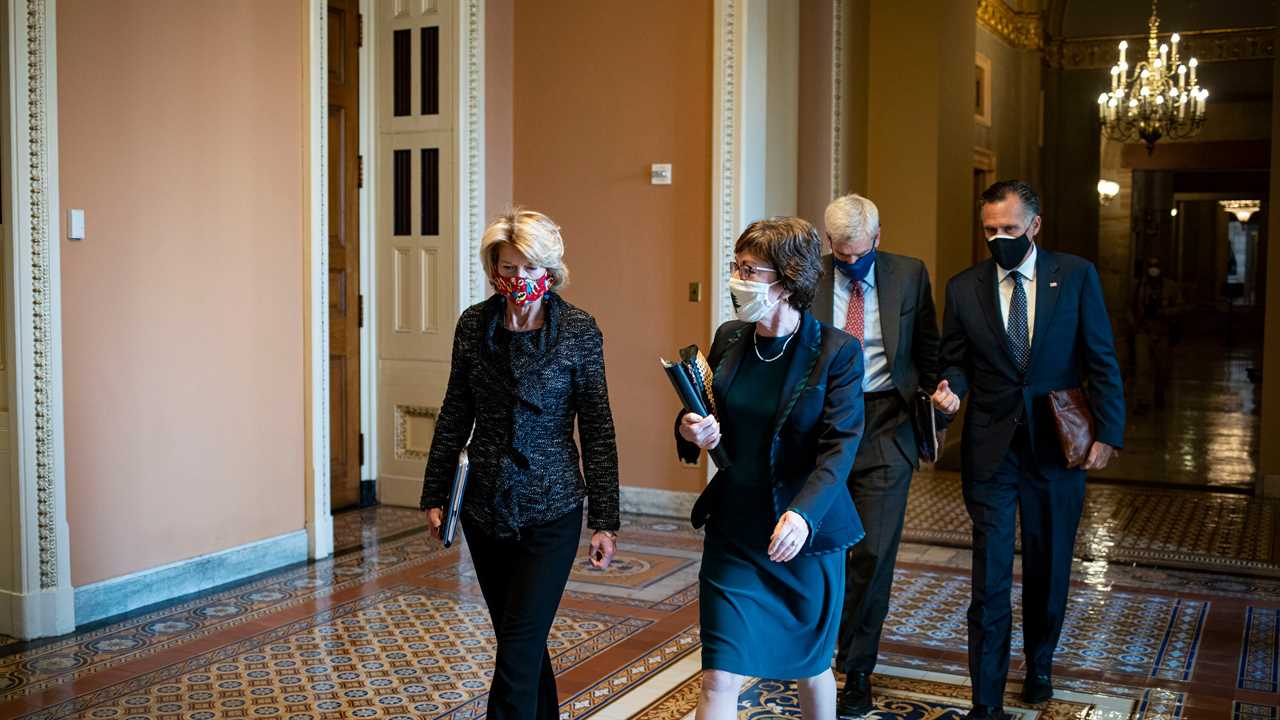
WASHINGTON — Congressional leaders moved on Wednesday to buy more time to strike an elusive deal on an economic relief measure to address the ruin wrought by the pandemic, but with time running short, it was unclear whether a compromise would pass.
The House overwhelmingly approved a one-week stopgap spending bill that would punt a Friday deadline for funding the government to Dec. 18, averting the immediate threat of a shutdown as negotiators continued to haggle over both a broader spending package and the pandemic aid bill.
The Senate was expected to approve the extension, which passed the House by a vote of 343 to 67.
But an agreement on providing billions of dollars in relief to families, businesses and hospitals remained out of reach.
“One way or another, we’ll get it done,” Speaker Nancy Pelosi vowed on Wednesday. Asked how long it would take to reach a deal, she added, “I’m hoping soon.”
There was little indication that she had directly revived talks with the Trump administration, which on Tuesday presented a $916 billion proposal that Ms. Pelosi swiftly dismissed as unacceptable. It cut funding for unemployment benefits and failed to revive enhanced federal weekly unemployment payments that lapsed over the summer. Instead, the plan, offered by Steven Mnuchin, the Treasury secretary, would provide another stimulus payment of $600 per adult and $600 per child.
“We obviously want to get people back to work,” Mr. Mnuchin said on Wednesday during a wide-ranging briefing. “By sending out checks, we’re putting money into the economy for people.
Ms. Pelosi and Senator Chuck Schumer, Democrat of New York and the minority leader, have instead focused on a $908 billion outline offered by a bipartisan group of moderate lawmakers as a starting point for negotiation.
But that group is struggling to hammer out the details of their compromise, primarily how to structure liability protections for businesses and how much funding to provide for state and local governments, issues which have long impeded an agreement.
“We are still working together on this,” said Senator Lisa Murkowski, Republican of Alaska and one of the lawmakers involved in the bipartisan discussions. “The possibilities are there to resolve this and to resolve this in a way that makes sense and gains support.”
A six-page framework of the moderates’ plan, which was obtained by The New York Times, said the group had an “agreement in principle” for providing $160 billion to state and local governments and offering liability protections to businesses and other institutions open during the pandemic “as the basis for good-faith negotiations.” But it omitted any substantive details.
The lack of specifics underscored the remaining hurdles for the group, which has steadily broadened in recent days, as it works to complete its plan. And some senators acknowledged that the success of any final agreement rested with congressional leaders in both chambers who had yet to fully embrace their work.
“I think at the end of the day that has to be largely negotiated between the speaker and the majority leader,” said Senator Roy Blunt, Republican of Missouri, who complimented the group on its progress so far. “If they have a broad base of consensus they can start with, maybe that makes it easier for them to make the final determinations.”
The moderates’ outline would revive the weekly federal unemployment benefit at $300 a week for 16 weeks, from the end of December to April, and extend a series of unemployment programs set to expire at the end of the month. It would supply $10 billion for child care providers, $25 billion in rental assistance, $82 billion for education providers, $6 billion for vaccine development and distribution, and $7 billion for state, local and tribal governments to conduct testing and tracing.
Their plan would repurpose money Mr. Mnuchin clawed back from the Federal Reserve and leftover funds in the expired Paycheck Protection Program and allow small businesses to receive another loan from the popular small-business program. It notably does not include another round of stimulus checks, which some lawmakers — including Senators Bernie Sanders, independent of Vermont, and Josh Hawley, Republican of Missouri — have lobbied for in recent days.
And while Democratic leaders have called it a starting point for negotiations, Senator Mitch McConnell, Republican of Kentucky and the majority leader, has not endorsed it. Instead, he suggested on Tuesday that Democrats drop their demand for funding for state and local governments in exchange for Republicans dropping their insistence on including a liability shield for businesses, an idea that Democrats immediately rejected.
Mr. McConnell slammed Democratic leaders on Wednesday for rejecting both the White House offer and his overture a day earlier, which was his first major concession since efforts to reach agreement on another coronavirus relief deal began.
“At every turn, they have delayed, deflected, moved the goal posts and made the huge number of places where Congress agrees into a hostage of the few places we do not,” he said.
Those involved in drafting the $908 billion framework insisted that there was a deal to be had.
In a lift to negotiators, the U.S. Chamber of Commerce, which supports liability protections, issued a statement applauding the group’s progress. Neil Bradley, the chamber’s executive vice president and chief policy officer, said, “While some difficult issues remain, we are confident that there are common-sense compromises that can be found that will enjoy the support necessary to become law.”
Representative Josh Gottheimer, Democrat of New Jersey and one of the lawmakers involved in the discussions, rejected the prospect of leaving without a deal.
“We’ll be working around the clock until we solve the liability and worker protection issue,” he said. “That’s really the last remaining hurdle. We have no choice but to get it done.”
Alan Rappeport, Nicholas Fandos and Luke Broadwater contributed reporting.






